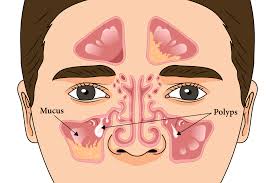 Chronic rhinosinusitis with nasal polyps (CRSwNP) is an important clinical entity diagnosed by the presence of chronic sinonasal inflammation.
Chronic rhinosinusitis with nasal polyps (CRSwNP) is an important clinical entity diagnosed by the presence of chronic sinonasal inflammation.
CRSwNP is a heterogeneous inflammatory disease of the upper airway.
It is characterized by epithelial barrier dysfunction and type 2 inflammatory mechanisms involving upstream epithelial cytokines that include thymic stromal lymphopoeitin and interleukin 33.
Symptoms include anterior or posterior rhinorrhea, nasal congestion, hyposmia and/or facial pressure or pain that last for greater than 12 weeks duration, along with facial pain, impaired sleep, and fatigue, which can affect the health related quality of life.
Nasal polyps are inflammatory lesions that project into the nasal airway, are typically bilateral, and originate from the ethmoid sinus.
Males are more likely to be affected than females but no specific genetic or environmental factors have been strongly linked to the development of this disorder to date.
CRSwNP is frequently associated with asthma and allergic rhinitis but the cellular and molecular mechanisms that contribute to the clinical symptoms.
Defects in the sinonasal epithelial cell barrier, increased exposure to pathogenic and colonized bacteria, and dysregulation of the host immune system are all thought to play prominent roles in disease pathogenesis.
Treatment includes intranasal, glucocorticoids, which have limited effect on nasal polyp size and symptoms.
Patient with severe recurring, chronic rhinosinusitis with nasal polyps may undergo repeated nasal surgery or rescue treatment with systemic corticosteroids.
Biologic treatments for type two inflammatory pathways have shown varying degrees of efficacy
Thymic stromal lymphopoeitin (TSLP) is a therapeutic target for patients with chronic sinusitis with nasal polyps.
Elevated levels of TSLP have been found in nasal polyp tissue.
Tezepelumab therapy leads to significantly greater reductions in the size of nasal polyps, severity of nasal congestion, reduction in sinonasal symptoms, and the use of nasal polyp surgery and systemicmsteroids than placebo in adults with severe, uncontrolled chronic rhinosinusitis with nasal polyps.
